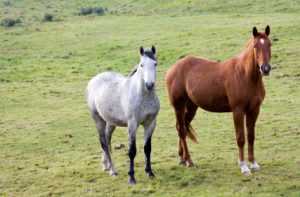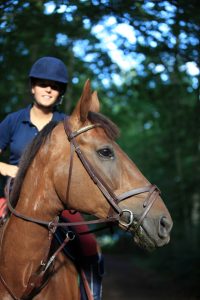How much is a horse worth? Yes, this is a trick question – and there are several answers, writes CAROLYN HENDERSON.
The nicest is the one you hear from an owner whose horse is part of the family and regarded as priceless. These owners tend to be women, and they often have a T-shirt that proclaims: “He

said it was me or the horse. We miss him”. Hands up, I’m one of them – although my husband bought me the T-shirt.
Another answer comes from a dealer friend. She reckons that a horse is worth whatever she can persuade someone to pay for him – and there is a logic to that, whether you’re talking about a horse to hack or a top class competition animal.
But however you assess market value, there’s an accepted tenet that most “ordinary” horses reach their prime market value when they are between seven and 10 years old. The reasoning is that by the time they get to seven, they’ve built up some experience and after that, accumulated wear and tear means they’re less likely to stay sound.
You can shoot holes in that argument remarkably easily. Younger horses can be just as prone to injury and its after-effects, while experience is only valuable if it’s good experience.
So why do so many riders still think that a horse in its teens isn’t worth considering? They could be missing a great opportunity.
One of my horses is 15 this year. Some readers will say that hardly counts as middle-aged and advances in nutrition and veterinary science back that up. His favourite hacking companion is an 18-year-old, ex-Grade A showjumper whom a friend bought as her first horse.
Hands up, I thought my friend was taking a huge risk. The vet who carried out a pre-purchase check found signs of an old injury, but thought the mare was suitable for low level Riding Club activities.
No one has told this lovely 17hh warmblood that she should be taking life more sedately. Watch her turn herself inside out when she’s loose-schooled, prick up her ears when she sees a jump and lengthen her stride out hacking and you’d take her for a horse half her age.

She still performs great flying changes and if you press the right buttons, you get the right results. For the first time in years - perhaps the first time ever - she’s hacking out, being treated like the princess she is and enjoying a varied lifestyle.
Treat older horses as individuals, rather than numbers, and you may be surprised at what they can offer and what you can achieve with them. There is a downside, of course, and that’s the fact that the older a horse is, the more likely it is that you will have to make difficult decisions at some stage.
The hardest decision of all is deciding when it’s time to do the last thing you can for his welfare. Retirement isn’t always an option for horses, owners, or both and old horses rarely die in their sleep. If you care about him, you’ll find the courage to do the right thing.
In the meantime, remember that with horses – and certainly with ponies, many of whom lead active lives well into their 20s – age is just a number, and can add up to many years of fun.
 said it was me or the horse. We miss him”. Hands up, I’m one of them – although my husband bought me the T-shirt.
Another answer comes from a dealer friend. She reckons that a horse is worth whatever she can persuade someone to pay for him – and there is a logic to that, whether you’re talking about a horse to hack or a top class competition animal.
But however you assess market value, there’s an accepted tenet that most “ordinary” horses reach their prime market value when they are between seven and 10 years old. The reasoning is that by the time they get to seven, they’ve built up some experience and after that, accumulated wear and tear means they’re less likely to stay sound.
You can shoot holes in that argument remarkably easily. Younger horses can be just as prone to injury and its after-effects, while experience is only valuable if it’s good experience.
So why do so many riders still think that a horse in its teens isn’t worth considering? They could be missing a great opportunity.
One of my horses is 15 this year. Some readers will say that hardly counts as middle-aged and advances in nutrition and veterinary science back that up. His favourite hacking companion is an 18-year-old, ex-Grade A showjumper whom a friend bought as her first horse.
Hands up, I thought my friend was taking a huge risk. The vet who carried out a pre-purchase check found signs of an old injury, but thought the mare was suitable for low level Riding Club activities.
No one has told this lovely 17hh warmblood that she should be taking life more sedately. Watch her turn herself inside out when she’s loose-schooled, prick up her ears when she sees a jump and lengthen her stride out hacking and you’d take her for a horse half her age.
said it was me or the horse. We miss him”. Hands up, I’m one of them – although my husband bought me the T-shirt.
Another answer comes from a dealer friend. She reckons that a horse is worth whatever she can persuade someone to pay for him – and there is a logic to that, whether you’re talking about a horse to hack or a top class competition animal.
But however you assess market value, there’s an accepted tenet that most “ordinary” horses reach their prime market value when they are between seven and 10 years old. The reasoning is that by the time they get to seven, they’ve built up some experience and after that, accumulated wear and tear means they’re less likely to stay sound.
You can shoot holes in that argument remarkably easily. Younger horses can be just as prone to injury and its after-effects, while experience is only valuable if it’s good experience.
So why do so many riders still think that a horse in its teens isn’t worth considering? They could be missing a great opportunity.
One of my horses is 15 this year. Some readers will say that hardly counts as middle-aged and advances in nutrition and veterinary science back that up. His favourite hacking companion is an 18-year-old, ex-Grade A showjumper whom a friend bought as her first horse.
Hands up, I thought my friend was taking a huge risk. The vet who carried out a pre-purchase check found signs of an old injury, but thought the mare was suitable for low level Riding Club activities.
No one has told this lovely 17hh warmblood that she should be taking life more sedately. Watch her turn herself inside out when she’s loose-schooled, prick up her ears when she sees a jump and lengthen her stride out hacking and you’d take her for a horse half her age. She still performs great flying changes and if you press the right buttons, you get the right results. For the first time in years - perhaps the first time ever - she’s hacking out, being treated like the princess she is and enjoying a varied lifestyle.
Treat older horses as individuals, rather than numbers, and you may be surprised at what they can offer and what you can achieve with them. There is a downside, of course, and that’s the fact that the older a horse is, the more likely it is that you will have to make difficult decisions at some stage.
The hardest decision of all is deciding when it’s time to do the last thing you can for his welfare. Retirement isn’t always an option for horses, owners, or both and old horses rarely die in their sleep. If you care about him, you’ll find the courage to do the right thing.
In the meantime, remember that with horses – and certainly with ponies, many of whom lead active lives well into their 20s – age is just a number, and can add up to many years of fun.
She still performs great flying changes and if you press the right buttons, you get the right results. For the first time in years - perhaps the first time ever - she’s hacking out, being treated like the princess she is and enjoying a varied lifestyle.
Treat older horses as individuals, rather than numbers, and you may be surprised at what they can offer and what you can achieve with them. There is a downside, of course, and that’s the fact that the older a horse is, the more likely it is that you will have to make difficult decisions at some stage.
The hardest decision of all is deciding when it’s time to do the last thing you can for his welfare. Retirement isn’t always an option for horses, owners, or both and old horses rarely die in their sleep. If you care about him, you’ll find the courage to do the right thing.
In the meantime, remember that with horses – and certainly with ponies, many of whom lead active lives well into their 20s – age is just a number, and can add up to many years of fun.











